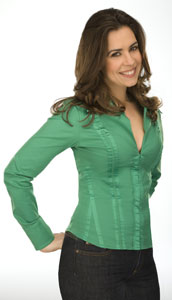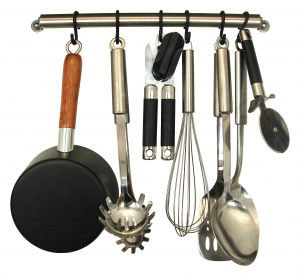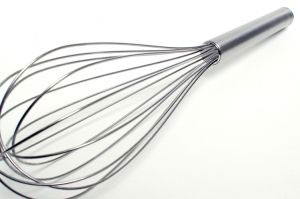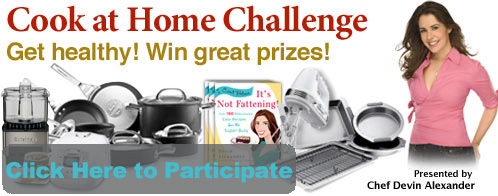 So last week I introduced myself (Chef Devin Alexander) and assured you that cooking is the answer to making sure you get and stay healthy. Now you may be thinking, “That’s easier said than done, Devin.” Don’t despair, stick with me right here on DietsInReview.com in the upcoming weeks and not only will I share some healthier versions of your killer favorites (that are just as killer to your taste buds, but not to the rest of you) and I’ll show you all sorts of other novice-chef must-knows for healthy living. Not only will I fill your head with all of the must-have info, I’ll be giving away some awesome (and valuable!) stuff! So don’t miss a week with me!
So last week I introduced myself (Chef Devin Alexander) and assured you that cooking is the answer to making sure you get and stay healthy. Now you may be thinking, “That’s easier said than done, Devin.” Don’t despair, stick with me right here on DietsInReview.com in the upcoming weeks and not only will I share some healthier versions of your killer favorites (that are just as killer to your taste buds, but not to the rest of you) and I’ll show you all sorts of other novice-chef must-knows for healthy living. Not only will I fill your head with all of the must-have info, I’ll be giving away some awesome (and valuable!) stuff! So don’t miss a week with me!
This week, I’m ready to tackle the kitchen. Whether you consider yourself an avid collector or a newbie when it comes to kitchen tools and gadgets, there are a few basic pieces that I highly recommend to assist you in preparing your healthy meals efficiently. I know it’s easy to feel overwhelmed when you’re deciding which key pieces to purchase for home cooking. Or, if you’re like me, maybe your kitchen gadget collection has grown to encompass so many pieces, it might be time to pull out the essentials and move the rest into storage to free up some space. Whether you’re just getting started on building your equipment arsenal or looking to streamline your current collection, below are the key pieces for making your healthy cooking adventures effortless!
Olive oil sprayer – Unlike the sprayers you buy pre-filled at the grocery store, these get filled with your choice of olive oil, so you don’t consume any added chemicals or propellants. These sprayers work just as well if not better than pre-filled ones. Look for them at Bed Bath & Beyond, at Williams Sonoma, Sur La Table or online.
Kitchen scale – Having a kitchen scale doesn’t mean you need to weigh everything, but it’s excellent for weighing protein (such as fish, chicken, or beef) and cheeses at least every once in awhile. Even though I work with food all day, my portions can creep up in size at times when I’m not being careful. Using my scale helps me stay in check. You can go with a basic one, or you can invest more on one with cool features, like a pull-out display or a database of popular foods.
 Measuring cups and spoons – Not only are these necessary for following recipes properly, but as with the kitchen scale, they are great tools for portion control. I always use my measuring spoons with ingredients like extra virgin olive oil or salad dressing since they’re very calorie dense. This is also not a place to spend a lot of money. Nowadays, you can even find durable and dishwasher-safe measuring cups and spoons at some 99-cent and bargain stores.
Measuring cups and spoons – Not only are these necessary for following recipes properly, but as with the kitchen scale, they are great tools for portion control. I always use my measuring spoons with ingredients like extra virgin olive oil or salad dressing since they’re very calorie dense. This is also not a place to spend a lot of money. Nowadays, you can even find durable and dishwasher-safe measuring cups and spoons at some 99-cent and bargain stores.
Parchment – Parchment is especially helpful if your nonstick bakeware isn’t so nonstick (either from lots of use or because the nonstick surface just isn’t super high quality), or if you just can’t afford to stock up on nonstick bakeware yet. You can line regular cookie and baking sheets with parchment paper to prevent food from sticking and to keep it in tact. It makes cooking a breeze and clean-up a snap!
Fine-cheese shredder –Shredding cheeses finely means that you use less to cover a larger surface area, and lower-fat cheeses melt better when shredded finely. I love to use a little finely shredded cheese on everything from omelets to homemade pizza.
Meat mallet – I like this for pounding chicken breast (to tenderize it) for oven-fried chicken cutlets, but it’s also a great all-purpose tool for jobs like crushing cookies and crackers. Buy one with a flat surface (to use on chicken and delicate items) and one with a toothed-side for tenderizing your lean cuts of beef.
A couple of high quality knives – Yes, good knives are an investment. But when it comes to high-end, expensive knives, you only need a couple: 1 all-purpose knife (such as a Santoku) for most cutting jobs and 1 utility knife for trimming and cutting raw meat. Then you’ll also want to have 1 serrated knife for slicing bread and tomatoes, but this one doesn’t need to be top-quality (though it’s fun if you happen to have some extra cash burning a hole in your pocket). You shouldn’t need much in the way of knives beyond these three, and if you do, you can opt for more affordable brands.
Cutting boards – Not only are good-quality cutting boards important for safety reasons (you never want to cut on a flimsy surface), but cutting on a nice board is better for the longevity of your kitchen knives. I like wooden or bamboo boards, but plastic boards are great, too (make sure the plastic ones are dishwasher safe so you can thoroughly sanitize them after working with raw meat). Use the plastic ones for raw chicken and other meats that could otherwise contaminate, then use the wooden ones for your veggies, cooked meats, cheeses, slicing citrus, etc. that contain less bacteria.
 Blender – Blenders make great sauces and purees, and I especially love them for smoothies. Make sure you get one with ice-crushing capability so you can easily blend ice and frozen fruit.
Blender – Blenders make great sauces and purees, and I especially love them for smoothies. Make sure you get one with ice-crushing capability so you can easily blend ice and frozen fruit.
Glass baking dishes – These are great for casseroles, baked pasta dishes, and desserts. You really only need two sizes for most dishes unless you’re cooking for a large family or party, and luckily they tend to be pretty inexpensive. Just pick up the 11 x 7-inch and 8 x 8-inch sizes, and you’ll be good to go! If you have a larger family or want lots of leftovers, you may want to pick up a 9 x 13 as well.
Non-stick cookware and bakeware – Of all the items on this list, these are definitely the most expensive, but I have to say I rely on them the most. Non-stick pans allow you to cook with little to no oil, which is essential for cutting fat from your diet. If you have to douse your pans with tons of oil or butter just to keep food from sticking, you are already adding tons of fat that’s just plain unnecessary. If a whole new set of pans seems too expensive, try buying just one or two pieces (I would recommend a medium or large skillet and saucepan to start). When it comes to bakeware, a small, medium, and large nonstick baking sheet is a great place to start. And remember to use only heat-safe nylon or wooden utensils on your nonstick surfaces to prevent scratching or damage.
Besides the essentials, there are some other kitchen gadgets I really love. If you have room in your budget for more pieces, I highly recommend the following:
Heavy whisk – Heavy whisks are great for mixing up batters and whipping egg whites.
Hand-held mixer – You can use a hand mixer for ease with everything from mixing up your healthy baked goods to whipping egg whites or even for making super smooth mashed potatoes.
Salad spinner – To make restaurant quality salads at home, you MUST get your lettuce super dry. There’s no quicker or easier way than using a salad spinner!
Meat thermometer – A good meat thermometer takes the guesswork out of cooking everything from the perfect roast to the Thanksgiving turkey. You can even find reasonably priced digital thermometers that are super accurate.
Steamer insert – Look for silicone versions that are not only inexpensive and durable, but they’re safer for your nice nonstick cooking surfaces than metal.
Rubber spatulas – Rubber spatulas can be lifesavers, especially when it comes to healthy cooking – you want to scrape every last drop of brownie batter or salad dressing out of the bowl! Make every calorie count!
Food processor and/or mini food processor – When it comes to grating a large amount of cheese, making the quickest whole-wheat pizza dough ever, or whipping up super simple sorbets with frozen fruit and yogurt, I love my food processor. The mini version is great for chopping herbs, mincing fresh garlic, and even grinding spices, while the larger one is great from processing oats to make whole grain oat flour or processing cubes of chicken breast to make extra lean ground chicken when you can’t find them at your grocery store and/or for making your whole wheat or whole grain breads and doughs.
Now you may be thinking that this list is long. And it is a bit long, but not every piece of equipment is necessary for everyone—unless you cook all the time. Then, the investment will be well-worth it in the long run because you’ll save so much money cooking that the equipment will more than pay for itself even in the short-run.
Happy Cooking (& Stocking Up!)
Devin
Ps: Don’t forget to check back in upcoming weeks. You don’t want to miss the chance to win some of these great tools and more!
Chef Devin Alexander is the author of several healthy cookbooks, including The Most Decadent Diet Ever! and The Biggest Loser Cookbook.

